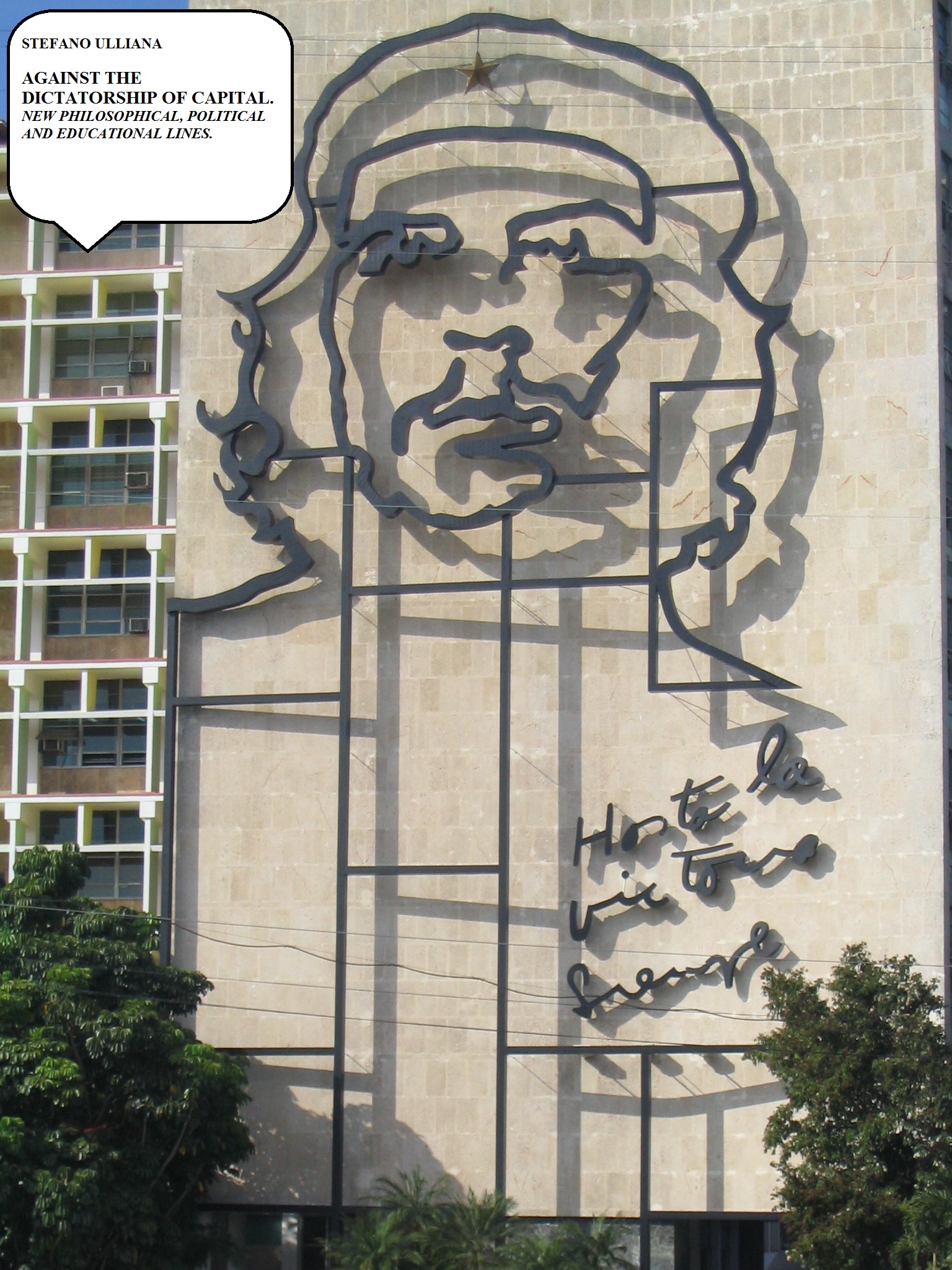
Lyotard’s post-modern critic leaves the field open to the manipulation of free and creative self-determination, that belongs to human nature, by the most reactionary forces of Capital. In fact, his critic to the concept and practice of universality leads to the adfirmation of the most violent and brutal ideological forces of capitalist neoliberalism. It uses the traditional ideology built up around the theological and political concept (with its relative practice) of the necessary and ordering One.
This concept, applied again in the contemporary age, leads towards a new patriarchal order and a plebiscitarian way to the world, helped besides by the control of the vehicle represented by global medias. The capitalist system assumes, in fact, as its ideology the tradition of the absolute artificial. This logic neutralizes natural and human autonomy and freedom, through the practice of self-instrumentalization and self-alienation. So in Western post-modern societes equality is only the common submission to the cumulative logic of Capital, while freedom lies solely in the abilities and virtues of mutual identification and selection upon the bases of merit. So, again, State and Capital identify the same logic of dispossession and disintegration of the roots of the natural and rational right, through the exchange of concrete reality with the power of image.
The replacement caused by the ideological domain of the image constitutes the reason for which the children/pupils of Western schools can not escape from a contradictory tension, between the needs requested by merit and the difficult, selective, discriminating liberation that this necessity ‒ if recognized and internalized ‒ in power guarantees. The solution of this tension appears when an even greater alienation emerges: when pupils learn how to make themselves a tool, in achieving their purposes. Now the path to self-instrumentalization and self-exploitiation has began, with the self-detachment (from one’s own natural and rational rights). The consequent bullying is in fact the reply on sixteenth of the aggressive and violent logic of the capitalist system, a winning form of adaptation and learning ‒ that unsuccessful is for those subjects who suffer from forms of cognitive disaffection or moral disengagement ‒ for school-age children and youth (think to barracks life) to the socio-economic and political dominant logic, which is hierarchical and authoritarian, exclusive and discriminatory. So, only the revolutionary solution, which is oriented to a form of radical democracy (in economic, social and political contexts), is the real solution. Even in the educative context.
There is, therefore, the necessity of a Manifesto for a new communist planetary movement (which has to be anticapistalist, feminist, animalist and ecologist). On the opposite side of the question social disintegration becomes a real objective for institutional (economic and political) powers, through the eradication of creative and relational, individual and collective, source. For financial global Capital every human subject has to be spossessed of its own potence and power, to leave total space and time to dominant ideological and practice overdetermination. Into this instrumental point of view then fall both the determination of the so-called operational and working flexibility (upper and lower flexibility), both the formation of the subject that should ‒ in the real logic of the system ‒ transmit and transfer the same instrumental point of view: the teacher. Western educative institutions so need a real revolution, that comes up from below, in order to develop true autonomy and self-government, also for pupils, who have to regain their future lives (in terms of mutual creative relationships).
Genre: POLITICAL SCIENCE / EssaysNo dates.
Chapter 1. Introduction
The definition of post-modernity as the tension of the spirit towards an open and indeterminate plurality of conceptions and concrete cultural achievements may perhaps allow the development of some general considerations, with preliminary value and having the function and purpose in order to contextualize a possible theoretical critic to its concept and its practical applications, especially in educational and teaching practices and processes.
Identifying the revolutionary horizon of XIX and XX centuries with the construction of real socialism and thus establishing a line of fatally deterministic development of universalist thought that mixes in quick succession Enlightenment, idealism and Marxism, Jean-François Lyotard seems apparently to welcome and develop further, in The post-modern Condition (1979),[1] the critical theory of the Frankfurt School, explained by Theodor W. Adorno and Max Horkheimer in The Dialectic of Enlightenment (1947).[2]
Considering objectivity as the ideal and the result of the progressive development of the forces of economic production and modern politics, inside the transcendent and absolute horizon of the State, post-modern position unifies and identifies in totalitarian thought and action both the thetic phase of capitalism and his antithetical one, that of Marxian socialism, in its Leninist and Stalinist version. Both of these phases would be united by the emergence of the violent and constrictive universality, that firstly submits the collective action to the exploitation of nature and to the necessary and massively increase of the profits of the capitalistic class of owners and then, on the contrary, it apparently aims to overthrow the previous purposes in growing the common power of the communist society, but bureaucratically directed and organized.
| Language | Status |
|---|---|
|
Italian
|
Translation in progress.
Translated by Valentina Stagnaro
|
|
Portuguese
|
Already translated.
Translated by Priscila Cabral
|
|
|
Author review: Good at every level. |
|
Spanish
|
Already translated.
Translated by Juanma Baquero
|
|
|
Author review: The text has been translated in a perfect mode. It has a great precision in rendering words and reflections. |